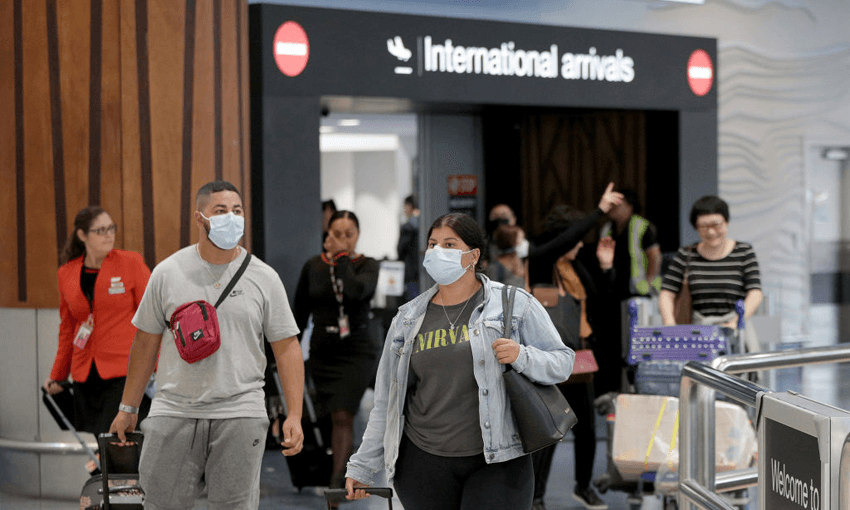The biggest danger facing New Zealand under level one will be the border. Justin Giovannetti looks at what the government is doing to increase border defences and prevent another influx of Covid-19.
As the elimination of coronavirus appears imminent in New Zealand, the country’s attention turns to its border and the conflicting need to keep new cases out while allowing more people in.
Under a level one announcement that could come as soon as Monday, restrictions on physical distancing and group sizes will completely disappear. As that happens, New Zealand’s already tough border restrictions will grow stricter as mandatory testing for newcomers start next week. New rules for aircrews and cargo ships are also being contemplated as the government looks to plug any holes through which the virus could reappear.
“We really want to make sure our border is watertight,” director general of health Dr Ashley Bloomfield told reporters on Wednesday afternoon. Regular testing of aircrews, particularly on the frequent flight between Auckland and Los Angeles which Bloomfield said poses the highest risk to New Zealand, could become necessary.
Currently, all travellers are required to go into 14-day managed isolation at hotels where they’re supervised around-the-clock and checked daily by nurses. The government has 10,000 hotel rooms set aside for arrivals in Auckland and Christchurch.
So far, testing of arrivals has been limited to those who’ve shown significant symptoms. Before being tested, travellers are removed from their regular hotel and transported in full protective gear to stricter quarantine hotels. Very few of the thousands of travellers who have entered the country have been tested but that could change as soon as Monday.
With few domestic safeguards under level one, a move by the government would signal that the virus is no longer a threat within New Zealand. However, over 120,000 new cases are still being reported daily around the world which means it needs to ensure no new cases come through the border to ensure the country can remain at level one,
“Let me be clear: The only reason we are in the enviable position of being even able to consider a move to alert level one is because of our strict border control,” said Prime Minister Jacinda Ardern. “We need to maintain strict border measures.”
While details still need to be finalised, the plan is to test all travellers at least twice during their managed isolation, according to Bloomfield. It’s unclear exactly when that testing will occur during their stays. Testing on aircrews will need agreement from Air New Zealand while testing on cargo vessel crews will be more complicated as it needs to respect international maritime treaties.
Thousands of New Zealand citizens and residents return home each month along with hundreds of travellers granted humanitarian or business exemptions. But in recent months, the torrent at the border has subsided. According to customs, the number of arrivals into New Zealand has plummeted from 741,173 passengers in January to just 5,577 in May.
As the number of residents returning to New Zealand begins to subside, the government has also allowed around 2,000 people to return under humanitarian exemptions or because they were deemed essential workers. Only around 20% of requests for exemptions have been granted, mostly to reunify families.
The programme has been allowed to grow despite ongoing concerns in the government of asymptomatic transmission. According to Ardern, one New Zealander tested positive five weeks after what was thought to be their exposure to the coronavirus. “Those are all reasons for us to balance listening to the science, but also opening up as soon as we can,” she said.
One government programme that’s captured public attention over the past week has also been the smallest – 201 workers have been allowed to enter the country with business permits, ostensibly for large economic projects. While the government points to workers allowed through the border to work on chair lifts or to fix a broken sewer pipe in Wellington, more than a quarter of exemptions have been for those in the film industry.
Ardern referred to the border situation now as a “dual process” with people entering under humanitarian exemptions and others under the emerging business programme. According to economic development minister Phil Twyford who’s responsible for the programme, 56 film workers have been allowed to enter the country, many working on the sequel to the movie Avatar. The existence of the government programme was only revealed after the Avatar film crew, which includes director James Cameron, began posting photos on social media of their arrival in the country.
While Ardern seemed to suggest on Wednesday that information on the program was readily available, The Spinoff could not find it online. An official from Twyford’s office said they were surprised no information was online and would ask the department to update the government website. They said the programme was limited to individuals who had expertise or talent that was difficult to find in New Zealand, work that couldn’t be done by a New Zealander, work that was critical to time-sensitive programmes, and projects of strategic or significant economic benefit.
“This is a very narrow exemption, there’s a very high bar,” Twyford told The Spinoff outside parliament on Wednesday. “Would I like there to more? Yeah, I would. I’m like everybody else. I want to see us get back to normal, I want to see the border open up, I want to see more people coming in. But this is a managed transition that needs to respect the need to protect New Zealand from Covid-19.”
According to Twyford, cabinet will be reviewing a paper in a few weeks to consider a “complete rethink” of the business exemption at the border.

